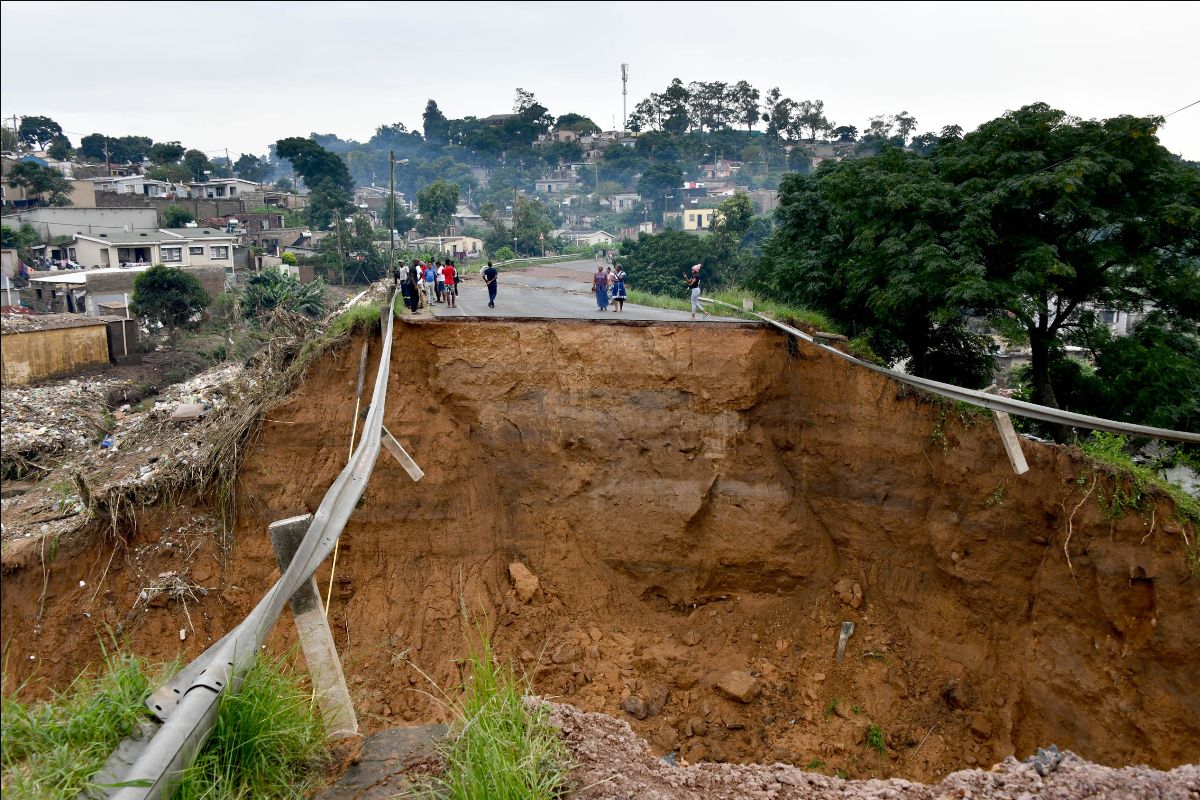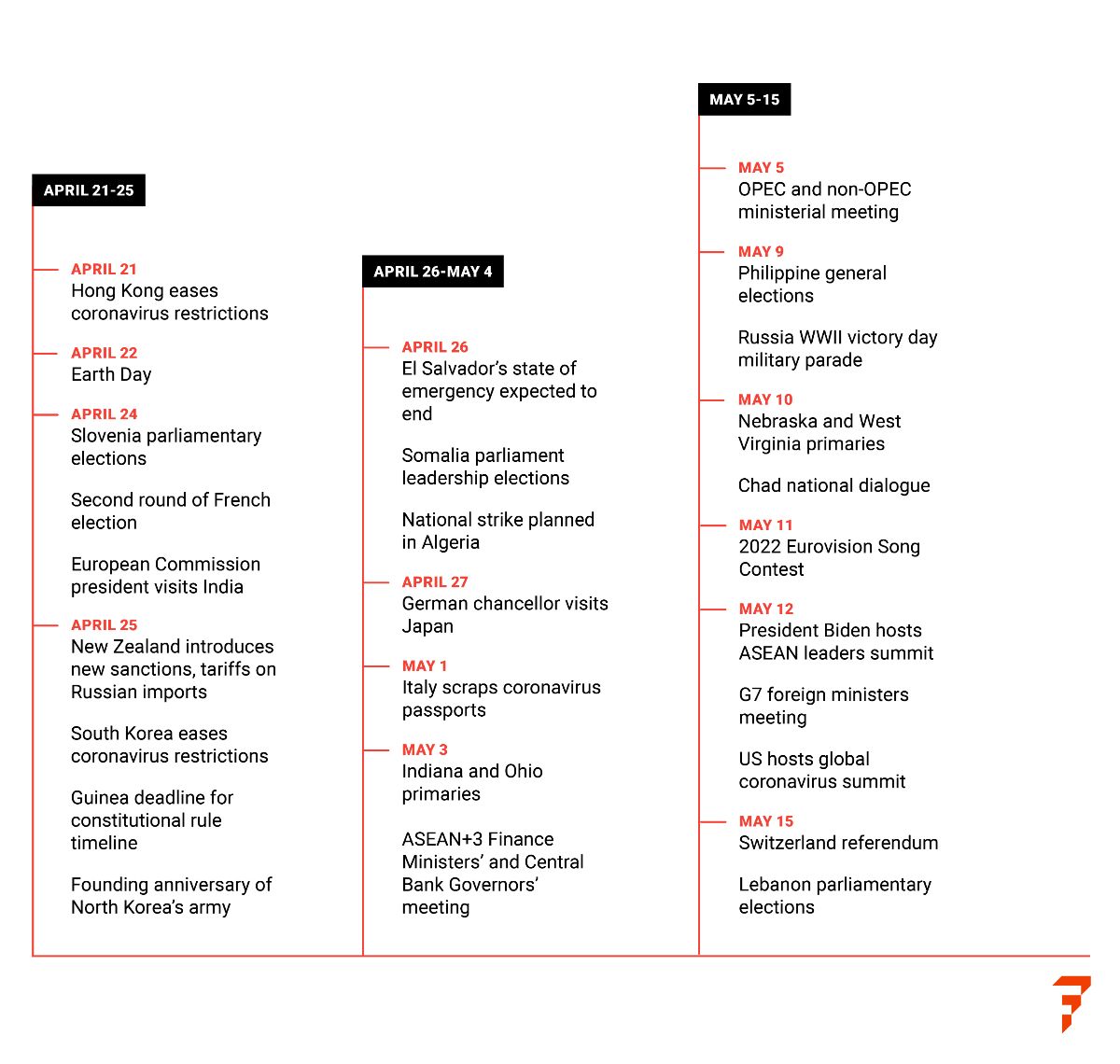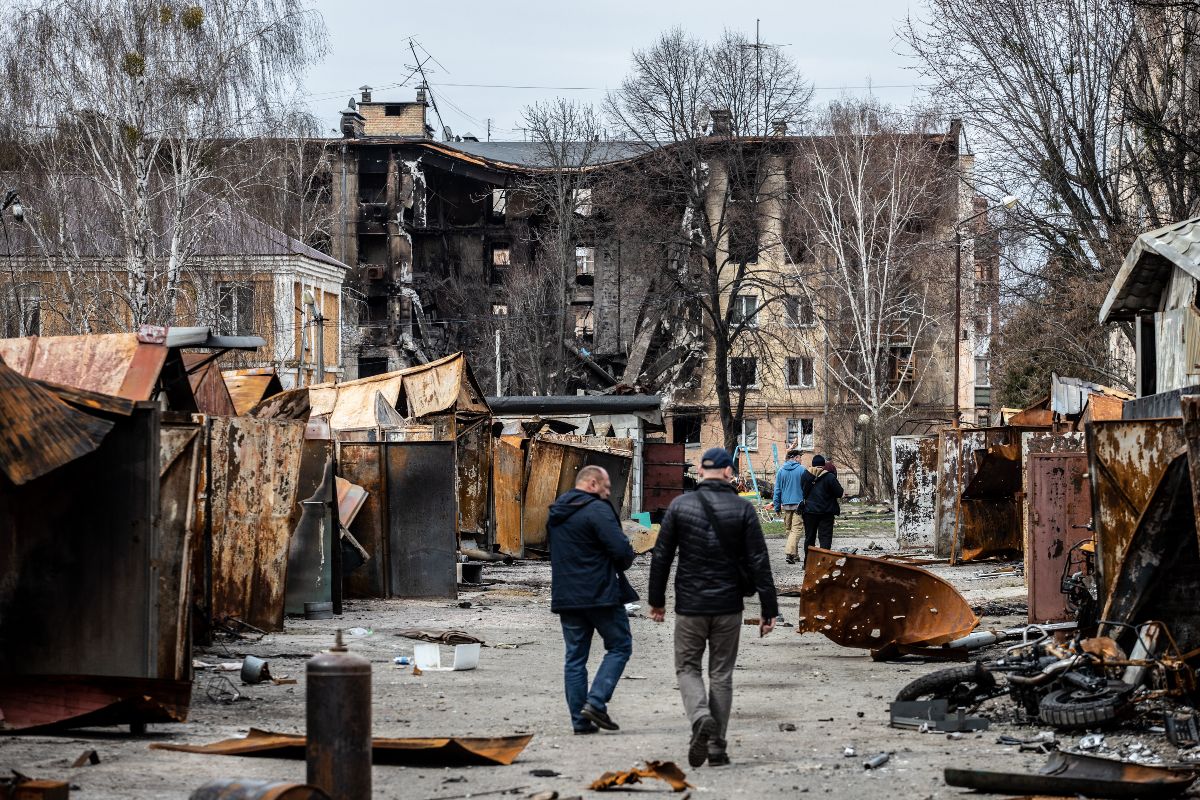Welcome to Factal Forecast, a look at the week’s biggest stories from the editors at Factal. We publish our forward-looking note each Thursday to help you get a jump-start on the week ahead. If you like what you see, you can subscribe for free.
With Israel’s ruling coalition having lost its majority in the Knesset, Prime Minister Naftali Bennett’s government is in crisis. In this week’s Factal Forecast podcast, Senior Editor Jimmy Lovaas and Editor Agnese Boffano discuss the challenges facing Bennett and how the escalating violence in East Jerusalem plays a role.
Listen now or download on your favorite platform.
A Look Ahead
April 24
Orthodox Easter threat in Ukraine
Both Ukrainian and Russian media warned this week of possible attacks targeting Orthodox churches in Ukraine on Sunday, with both sides blaming the other for the potential violence.
What’s happened so far
On Monday, the Russian Defense Ministry accused Ukrainian forces of planning to shell churches in several southern and eastern Ukrainian regions — including Kharkiv, Mykolaiv, Sumy, Odessa and Zaporizhzhia — and blaming the attacks on Russian troops. Shortly after, Ukrainian authorities countered Russia’s statement, warning that the messages indicate Russia may carry out such attacks to frame Ukrainian forces. Neither claim has been independently corroborated by any outside parties. Meanwhile, U.N. Secretary-General António Guterres is calling for a four-day ceasefire beginning today to coincide with Holy Week observances for Orthodox Christians.
The impact
The claims come as the war enters a new phase with the focus shifted toward eastern Ukraine’s Donbas region. Russia has escalated its assault along a front stretching more than 300 miles from northeast to southeast Ukraine, while continuing to resupply its forces. Russian Foreign Minister Sergey Lavrov said the goal was “full liberation” of breakaway regions Donetsk and Luhansk, which if successful, would hand Russia control over Ukraine’s industrial center of coal mines and factories.
April 24
Second round of French election
French President Emmanuel Macron and far-right opponent Marine Le Pen will progress to a runoff on Sunday after no candidate secured a majority in the first round of the country’s presidential election.
What’s happened so far
In voting earlier this month, Macron secured 27.8 percent of the votes while Le Pen, the leader of the National Rally party, secured 23.1 percent. Left-wing candidate Jean-Luc Mélenchon failed to progress to the second round after coming in third place with 22 percent of the vote. Protests against Le Pen erupted in Paris over the weekend, with police deploying tear gas at least once.
The impact
According to recent polling, Macron has managed to consolidate his lead over Le Pen by between 7 to 12 percentage points. Still, Le Pen’s strong results in the first round worried E.U. officials as the far-right candidate pledged to cut France’s contributions to the E.U., tighten border controls and call a referendum on immigration policy.
April 24
Slovenian elections
Slovenians will vote in a parliamentary election Sunday with current Prime Minister Janez Janša’s center-right Slovenian Democratic Party (SDS) party facing a challenge from the green Freedom Movement (GS) party, led by businessman and politician Robert Golob.
What’s happened so far
Entering the last week before the election, GS polled at 24 percent, tying SDS, according to Politico. With more than a dozen parties participating in the election, support from smaller parties can make or break the next government, Slovenian President Borut Pahor said.
The impact
Analysts say that Janša’s re-election could steer the country toward autocratic legalism and the Eurosceptic Hungary-Poland alliance, while his defeat and a center-left alliance would be anticipated to guide the country in a western direction.
April 25
South Korea eases coronavirus restrictions
South Korea will allow people to eat and drink in public areas such as movie theaters and religious institutions starting Monday as the country phases out its coronavirus orders.
What’s happened so far
A large coronavirus wave caused by the omicron variant reached its peak in March with more than 621,000 cases in a single day. Since then, the Korean government began winding down restrictions. Starting this week, the country loosened its social distancing rules that limited the number of people allowed in a building and ended limits on business hours of restaurants and bars.
The impact
Earlier this month, President Moon Jae-in said he hoped South Korea would be a leading country to switch to endemic measures. Face coverings are still required in most public places, but the government plans to revisit that rule later this month. If coronavirus cases continue to drop, analysts say the country could be well equipped for a post-pandemic world with its highly vaccinated population and widespread trust in the public health system.
April 25
Founding anniversary of North Korea’s army
North Korea appears to be preparing a massive military parade in anticipation of the 90th founding anniversary of the North Korean People’s Revolutionary Army on Monday, according to new satellite imagery.
What’s happened so far
Two major anniversaries have passed already this year in North Korea: founder Kim Il Sung’s 110th birthday and current leader Kim Jong Un’s 10th year in power. The country marked each event with fireworks and a civilian parade, followed by yet another round of missile testing last week ahead of a nine-day joint U.S.-South Korea military exercise that North Korea sees as a threat.
The impact
If held, North Korea may use the military parade as an opportunity to display weaponry such as intercontinental or submarine-launched ballistic missiles. If not, some experts say North Korea may not have new missiles to show off and that a nuclear test may be the next likely provocation, as restoration work appears to continue at the Punggye-ri nuclear test site.
April 25
Guinea deadline for constitutional rule timeline
Guinea’s interim government has until Monday to propose a timeline for a return to constitutional rule following a coup in September 2021 that saw President Alpha Condé ousted by the military. The takeover was led by prominent soldier Col Mamady Doumbouya who then proclaimed himself interim president.
What’s happened so far
Following the coup, the African Union suspended Guinea and the 15-member Economic Community of West African States (ECOWAS) sanctioned the country. ECOWAS told leaders in Guinea to prepare an acceptable timeline of transition by the end of April, or the government and the National Transition Council would face further curbs.
The impact
According to the ECOWAS statement in March, economic and financial sanctions will be immediately applied if no timetable outlined, following earlier missed deadlines. The bloc also put pressure on Mali’s transitional government, giving them 12 to 16 months to organize elections.
April 26
El Salvador’s state of emergency expected to end
El Salvador’s state of emergency is expected to end Tuesday after the initially proposed 30 days of enforcement.
What’s happened so far
President Nayib Bukele announced the state of emergency after the country saw a large uptick in violence across three days last month, resulting in at least 87 deaths across El Salvador. Sweeping measures infringing upon civil liberties were taken, including arrests without warrants or charges, communications monitoring and strict restrictions on gatherings. These measures have reportedly resulted in more than 13,000 arrests, targeting prominent gangs such as MS-13 and 18th Street.
The impact
The state of emergency has infringed heavily on human rights and media censorship. Police have reportedly used unnecessary and excessive force, including torture and degrading treatment, and journalists were threatened with arrest and up to 15 years in prison if suspected of “relaying gang messages.” While the state of emergency is expected to end, Bukele could still extend it under the umbrella of further eradicating gang violence, which could lead to the arrest of more civilians and journalists.
April 26
Somalia parliament leadership elections
Somalia’s parliament will elect their Lower House and Upper House speakers over two days beginning Tuesday amid an extended electoral period marked by Al-Shabab attacks.
What’s happened so far
Somalia’s parliament swore in most of the new lawmakers of its two chambers last week after months of delayed elections amid a power struggle between President Mohamed Abdullahi Mohamed and Prime Minister Mohammed Hussein Roble. As the political crisis dragged on, Al-Shabab militant attacks targeting security forces and officials further destabilized the country. The most recent attack claimed by the group injured at least six people during a parliamentary session to register speakership candidates on Sunday.
The impact
The appointment of new parliamentary speakers will precede the presidential election in a country that hasn’t held a popular election in 50 years. In the most recent parliamentary election, only community leaders voted on behalf of their constituents. The date of the presidential election has not yet been announced.
What Else Matters

(Photo: South Africa’s Government Communication Information System)
Israel political crisis
Israel’s governing coalition lost a majority in the Knesset this month after a whip from Prime Minister Naftali Bennett’s party joined the opposition following a reported internal row over Passover traditions. Subsequently, last weekend, the Arab bloc of the coalition froze its membership in protest of a recent violent raid at Al-Aqsa Mosque in East Jerusalem that left more than 150 Palestinians injured and 300 people arrested.
Watch for: Bennett’s coalition, which ranges from his right-wing party to the United Arab List, formed a majority in 2021 when they ousted long-serving former Prime Minister Benjamin Netanyahu. The coalition can continue to rule while not maintaining a majority but faces the possibility of the Knesset being dissolved, which could potentially lead Israelis back to the polls. Although the Arab bloc said it would not support a no-confidence vote against the coalition, the opposition led by Netanyahu has called for this. If a no-confidence motion is indeed raised, it will need the support of at least 61 members of Knesset, posing a challenge to a government that lost its majority.
South Africa flooding
South Africa is facing one of the worst flooding episodes in its modern history after a storm system inundated the county’s KwaZulu-Natal province early last week, leaving more than 400 people dead, thousands more homeless and causing about $700 million of infrastructure damage.
Watch for: The nation of 59 million people is under a state of disaster, activating 10,000 troops to help with relief and cleanup efforts. Large areas around the city of Durban, one of the continent’s busiest ports, remain without power or running water. Meteorologists said the flooding was caused by a normal weather pattern for the region known as a cut-off low pressure system, but forecasters warned of climate change intensification. The storm dumped up to 12 inches of rain in some parts of KwaZulu-Natal in a single day, amounting to nearly 70 percent of the country’s average annual rainfall.
Extended Outlook
What’s on our radar in the coming weeks…

Thanks for reading! If you want the newsletter in your inbox, you can sign up for free.
Lead photo: People survey the destruction in Hostomel, Ukraine, on April 14, the 50th day of the Russian invasion into Ukraine. (Photo: Kyiv City State Administration / Alexei Samsonov)
What is Factal?
Trusted by many of the world’s largest companies and nearly 300 humanitarian NGOs, Factal is a risk intelligence and collaboration platform that brings clarity to an increasingly noisy and uncertain world.
Powered by a hybrid of advanced AI and experienced journalists, Factal detects early signals, verifies critical details and assesses the potential impact at the speed of social media. From physical incidents and brand mentions to geopolitical developments, Factal offers the most trusted, real-time risk intelligence on the market.
Factal is also home to the largest security and safety collaboration network in the private sector. Members securely share information with other members in proximity to the same incident, both on Factal.com and the Factal app.
Learn more at Factal.com, and we’d love to hear from you.

